|
|
|
Sort Order |
|
|
|
Items / Page
|
|
|
|
|
|
|
| Srl | Item |
| 1 |
ID:
137605
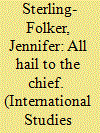

|
|
|
|
|
| Summary/Abstract |
Analytical pluralism in IR theory is a welcome development, yet it may also play a role in reifying our contemporary liberal world order. While there is clearly greater analytical diversity in the IR discipline today than in the latter half of the twentieth century, it is a diversity that is contained within the boundaries of acceptable liberal discourse. As a result, it does not constitute a challenge to dominant disciplinary ways of knowing and being. IR theory may enjoy a circumscribed version of analytical diversity in which multiple voices may speak but power does not listen. This possibility and its implications are considered, with particular attention paid to liberalism and positivism as the dominant analytical project of the contemporary moment.
|
|
|
|
|
|
|
|
|
|
|
|
|
|
|
|
| 2 |
ID:
117521
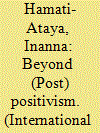

|
|
|
|
|
| Publication |
2012.
|
| Summary/Abstract |
This paper explores Pragmatism's potential for transcending the antagonism between positivism and post-positivism, through the work of Morton Kaplan, who combines a Pragmatist theory of knowledge with a systems theory of world politics. A reconstruction of Kaplan's synoptic philosophy shows how Pragmatism can help us move beyond the dual fallacy of truth as correspondence and truth as self-consciousness, to a non-foundationalist epistemology that acknowledges the historicity of knowing without annihilating the realism of the common world we live in. Moving from the realm of knowledge to the realm of judgment, this paper also reconstructs Kaplan's moral analysis, thereby revealing its significance for the discipline's renewed concern for the problems of values and reflexivity.
|
|
|
|
|
|
|
|
|
|
|
|
|
|
|
|
| 3 |
ID:
117031


|
|
|
|
|
| Publication |
2012.
|
| Summary/Abstract |
In a 2008 International Politics article, David Patrick Houghton questions the importance of 'The Third Debate' in IR theory between 'positivism and postmodernism' and the relative worth of contrasting epistemological positions. Houghton's main argument is that the philosophical underpinnings of IR have not been central to what IR scholars actually do; specifically, the epistemological differences between positivists and postmodernists have little practical effect upon their empirical findings. In short, epistemology does not matter. This article analyses Houghton's thesis within the context of a dominant discourse in the discipline that derides postpositivism and, by corollary, rejects methodological pluralism incorporating both positivist and postpositivist approaches, what I refer to as 'epistemethodological pluralism'. This article questions the main assumptions underpinning this discourse by deconstructing the definition of 'postpositivism' that underpins the 'naysayer' arguments deriding or dismissing epistemological differences between positivism and postpositivism. Using examples of positivist and postpositivist research that focus on the foreign policy of the United States, European Union integration and Middle East politics, the article demonstrates how epistemological issues have a significant impact on empirical research in International Relations and illustrates the benefits of integrating the different epistemological approaches.
|
|
|
|
|
|
|
|
|
|
|
|
|
|
|
|
| 4 |
ID:
117842
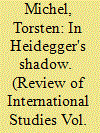

|
|
|
|
|
| Publication |
2012.
|
| Summary/Abstract |
The field of International Relations (IR) although in many quarters still immersed in the epistemological trenches surrounding the fourth debate between positivism and post-positivism saw the emergence of a renewed interest and debate about the state and rigour of 'our' ontological assumptions. One currently very prominent contribution to this emerging or re-emerging interest in ontological questions can be found in the Critical Realist (CR) approach.
|
|
|
|
|
|
|
|
|
|
|
|
|
|
|
|
| 5 |
ID:
141728
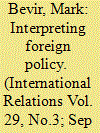

|
|
|
|
|
| Summary/Abstract |
This Special Issue advances an interpretive research programme into Foreign Policy Analysis (FPA) and International Relations by showcasing new work on the study of foreign policy and regional cooperation. This introductory article explains the rationale and contents of the Special Issue in three parts. The opening part explains how the contributions complement the broader study of ideas in FPA and International Relations through a critique of methodological positivism in the social sciences. The second part elaborates the theoretical framework used to cohere the collection, which centres on the study of ‘situated agents’ who, when confronted with policy dilemmas, draw on inherited traditions to inform their foreign policy practices. This is accompanied by a methods case study centring on David Cameron’s European Union referendum strategy, which is used to illustrate the practical ways in which one can conduct interpretivist research into foreign policy. In conclusion, we spell out how the contributors conducted their work to advance the interpretivist research programme.
|
|
|
|
|
|
|
|
|
|
|
|
|
|
|
|
| 6 |
ID:
101517
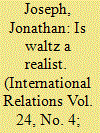

|
|
|
|
|
| Publication |
2010.
|
| Summary/Abstract |
In the opening chapter of Theory of International Politics Waltz makes an interesting distinction between scientific laws and theory construction. Recent special issues of this journal have suggested that this distinction allows Waltz to be read in different ways - for example, as a scientific realist who conceives of unobservable entities, or as a constructivist interested in how we create models. This contribution argues against both these interpretations by analysing the first chapter of Waltz's book and suggesting that his distinction between theories and law-like statements is fully consistent with mainstream discussions in the philosophy of social science. It argues that Waltz's position still depends on the identification of empirical regularities, something that makes him an empirical realist, but which undermines the claim that he is a scientific realist.
|
|
|
|
|
|
|
|
|
|
|
|
|
|
|
|
| 7 |
ID:
191961
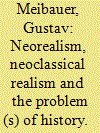

|
|
|
|
|
| Summary/Abstract |
Following scholarship on IR’s ‘historical turn’ as well as on neorealism and neoclassical realism, this article finds fault particularly in neorealism’s implicit reliance on the historically contingent but incompletely conceptualised transmission of systemic factors into state behaviour. Instead, it suggests that neoclassical realism (NCR) is well-suited to leveraging ‘history’ in systematic and general explanation. This article interrogates two routes towards a historically sensitive NCR (intervening variables and structural modifiers), and how they enable different operationalisations of ‘history’ as a sequence of events, cognitive tool or collective narrative. The first route suggests history underpins concepts and variables currently used by neoclassical realists. Here, history is more easily operationalised and allows a clearer view at learning and emulation processes. It is also more clearly scoped, and therefore less ‘costly’ in terms of paradigmatic distinctiveness. The second route, in which history modifies structural incentives and constraints, is more theoretically challenging especially in terms of differentiating NCR from constructivist approaches, but lends itself to theorising systemic change. Both routes provide fruitful avenues for realist theorising, can serve to emancipate NCR from neorealism in IR and foster cross-paradigmatic dialog. Examining how ‘history’ can be leveraged in realism allows interrogating how other ‘mainstream’, positivist approaches can and should leverage historical contingency, context and evidence to explain international processes and outcomes.
|
|
|
|
|
|
|
|
|
|
|
|
|
|
|
|
| 8 |
ID:
118164
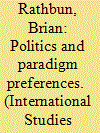

|
|
|
|
|
| Publication |
2012.
|
| Summary/Abstract |
Are international relations scholars objective observers of political events, or do our political preferences influence the way in which we see the world? This article explores that question using data from a survey of international relations scholars. It develops and tests hypotheses about how we might expect adherents of particular paradigms to identify themselves politically on a left-right scale based on the resonance between the content of ideology and the key propositions of different schools of thought in IR. Although they are relatively centrist, I find that realists are the most conservative and right-leaning of international relations scholars, while Liberals are more liberal and left-leaning. Although neither approach has any intrinsic ontological content, rationalism and constructivism also have a distinct ideological profile, the former being more conservative than the latter. Post-positivist epistemological commitments are associated with the political left. More importantly, there is an interaction between ontology and epistemology. Positivism plays a role in breaking the link between political values and paradigm choice. Nonpositivists demonstrate the strongest connection between ideology and international relations approach. I consider the implications of these findings for the use of paradigms in international relations theorizing, arguing that they should make us more circumspect about the use of paradigms in our discipline.
|
|
|
|
|
|
|
|
|
|
|
|
|
|
|
|
| 9 |
ID:
086299


|
|
|
|
|
| Publication |
2008.
|
| Summary/Abstract |
Since the 1990s, international relations theory (IR) has supposedly been in the grip of a 'Third Debate', this time between positivism and postmodernism. While many have cast doubt as to whether this is in fact the case, and others have argued that it is time to move beyond it, it remains true to say that the issue of positivism vs postpositivism has occupied the minds of a number of academic analysts in recent years. This article takes the more radical position of questioning whether this epistemological debate - if, indeed, one accepts that there is one - has any real import in the sense of influencing the empirical research that IR scholars actually conduct. In short, whether one embraces a positivist or a postmodernist epistemology (for example) has little practical effect upon one's empirical findings. By extension, this argument suggests that the emphasis on the philosophical underpinnings of IR, while not necessarily misconceived in and of itself, has thus far not been central to what IR scholars actually do.
|
|
|
|
|
|
|
|
|
|
|
|
|
|
|
|
| 10 |
ID:
122917
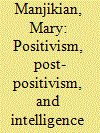

|
|
|
|
|
| Publication |
2013.
|
| Summary/Abstract |
In recent years, the Intelligence Community has been rather infatuated with positivist social science. Analysts like Stephen Marrin and Gregory Treverton have suggested that the best way for practitioners to reform intelligence analysis (and indeed the whole intelligence cycle) is to borrow positivist methodologies such as evidence-based practices and hypothesis testing from academic scientists and social scientists. Here, analysts seem particularly drawn to making analogies with the medical profession. The constraints which practitioners face and the methodologies they use in making an assessment or diagnosis are frequently compared. For example, Gary McClelland noted that:
Just as physicians often have to make quick assessment based on limited and sometimes conflicting information sources with no two cases ever being quite the same, so too intelligence analysts evaluate and characterize evolving situations using partial information from sources varying in credibility. 1
|
|
|
|
|
|
|
|
|
|
|
|
|
|
|
|
| 11 |
ID:
133557
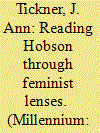

|
|
|
|
|
| Publication |
2014.
|
| Summary/Abstract |
In this article, I suggest ways in which feminist analysis would further enrich Hobson's text. Questioning Hobson's assumption that it is possible to create separate 'metanarratives' about Eurocentrism and patriarchy, I claim that patriarchy, imperialism and Eurocentrism were co-constituted through the practices of Western imperialism and the creation of modern Western knowledge. I then take up Hobson's question that asks whether one is, or is not, Eurocentric is a more important question than whether or not one is a positivist. I argue that both these questions are important and interrelated. Whereas positivism aspires to tell one universal story, post-positivism acknowledges that all theories are constructed in the interest of someone. Therefore it offers us the opportunity to be reflective about our epistemological standpoints - whether or not they are Eurocentric. I then describe some methodological sensitivities concerning these issues that IR feminists have brought to their research. I conclude by reviewing some feminist post-colonial literature that reflects these sensitivities, thereby offering us some tools to overcome the Eurocentric trap.
|
|
|
|
|
|
|
|
|
|
|
|
|
|
|
|
| 12 |
ID:
100199
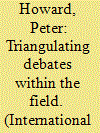

|
|
|
|
|
| Publication |
2010.
|
| Summary/Abstract |
Undergraduate introductory methods courses offer a unique opportunity to bring methodological pluralism to the field by teaching students multiple approaches to research. This article presents one way to organize an introductory undergraduate research methods course. By focusing on central debates between methodological approaches on issues of causality, context, and essentialism, an instructor can introduce positivism, interpretivism, and relationalism as distinct, coherent methodological approaches to research. Depicting these three debates and three approaches graphically on a triangle can illuminate some core methodological debates within the field today. It also illuminates the methodological underpinnings of many of the discipline's theoretical debates.
|
|
|
|
|
|
|
|
|
|
|
|
|
|
|
|
| 13 |
ID:
090144
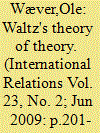

|
|
|
|
|
| Publication |
2009.
|
| Summary/Abstract |
Waltz's 1979 book, Theory of International Politics, is the most influential in the history of the discipline. It worked its effects to a large extent through raising the bar for what counted as theoretical work, in effect reshaping not only realism but rivals like liberalism and reflectivism. Yet, ironically, there has been little attention paid to Waltz's very explicit and original arguments about the nature of theory. This article explores and explicates Waltz's theory of theory. Central attention is paid to his definition of theory as `a picture, mentally formed' and to the radical anti-empiricism and anti-positivism of his position. Followers and critics alike have treated Waltzian neorealism as if it was at bottom a formal proposition about cause-effect relations. The extreme case of Waltz being so victorious in the discipline, and yet being so consistently misinterpreted on the question of theory, shows the power of a dominant philosophy of science in US IR, and thus the challenge facing any ambitious theorising. The article suggests a possible movement of fronts away from the `fourth debate' between rationalism and reflectivism towards one of theory against empiricism. To help this new agenda, the article introduces a key literature from the philosophy of science about the structure of theory, and particularly about the way even natural science uses theory very differently from the way IR's mainstream thinks it does - and much more like the way Waltz wants his theory to be used.
|
|
|
|
|
|
|
|
|
|
|
|
|
|
|
|
|
|
|
|
|